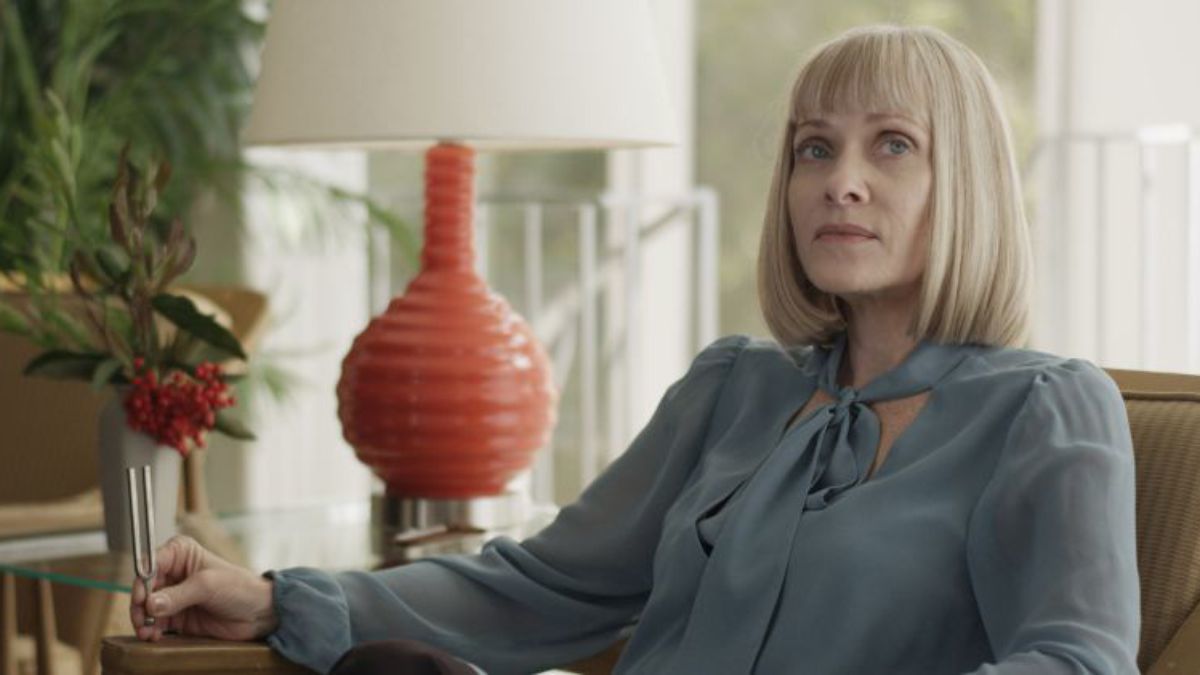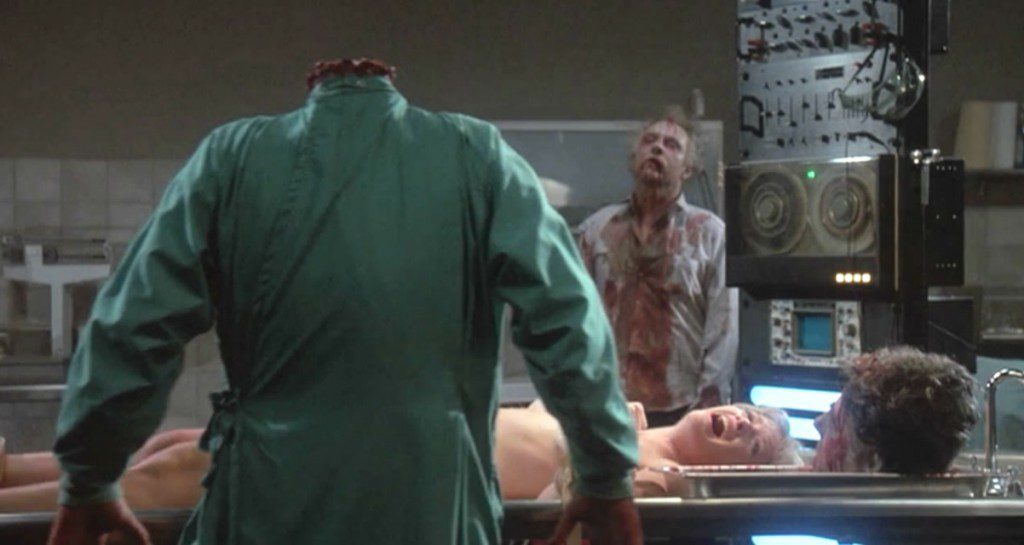Legendary horror icon Barbara Crampton is best known for starring in 80s gore-fests like Re-Animator (1985), From Beyond (1986) and Chopping Mall (1986). You’ll find her name on every “Greatest Scream Queens of All Time” listicle, where horror nerds rate actresses according to how ear-piercing their shriek is. But that label—”scream queen”—is something she’s keen to get away from, and it’s not hard to understand why. It’s reductive and, she says, “implies that you’re good at two things: howling at the top of your lungs and being a woman.”
A couple of months ago, Crampton penned an article with her thoughts on the term. In it she explains how the label “diminishes the merit of what we try to do,” and that female actors are “more than the sum of the strain of their vocal cords.”
Videos by VICE
Despite the debate that she’s opened up about scream queens—a term which, for the record, she’s totally happy for her peers to use and embrace—the moniker continues to follow her. In reviews of her upcoming film Sun Choke—an indie horror anchored by three compelling female characters—critics have slapped the label on Crampton yet again. I called her up to talk about being pigeonholed, what it was like to be a female actor in horror during the 80s, and her thoughts on the notorious scene from Re-Animator that many deemed exploitative.
Read more: The All-Female Collective Championing Horror Films for the Girls
BROADLY: Reading reviews of your new film Sun Choke I was surprised that some critics—typically male critics—are still referring to you as a scream queen.
Barbara Crampton: Yeah, it’s not really a term I like. I’ve come to not be in favor of the term [laughs]. It just seems like too broad a definition for the intricate work that a lot of ladies are doing and continue to do. And I think movies are different now. I don’t think they fit into their definitive genres and boxes so easily. We see so much crossover now between thriller and horror and comedy. Things are evolving and I think it’s too specific of a term, and it has a cheesy tone to it. So I don’t think it’s beneficial.
It sounds sleazy the more you think about it…
Yeah, it feels like it. I wouldn’t use the term myself but you can use it if you like [laughs].

Film still from “Sun Choke”
Since you first tweeted about it, the debate seems to have opened up and people are rethinking the term. Was that your hope?
Yeah. It’s something that I just started thinking about. I’d come back to working over the past number of years after taking a little bit of a break, and people were talking about me, using that label—and in fond terms, too. But I just started thinking about it and it just didn’t feel right to me.
What’s the most condescending thing about the term?
I think it’s reductive. It puts [the performance] in a place on the shelf, and I think it has an undertone, a quality, the terminology that is potentially a little misogynistic and pigeonholes you in being representative of a woman who’s screaming and who’s in fear and who doesn’t have her own strength.
It’s a male-dominated society—it still is.
How did it feel to be pigeonholed like that back in the heyday of slasher movies?
You know, I didn’t think about it back then. I don’t remember thinking of it in fond terms or thinking of it in terms that I shied away from. At times I probably thought they put Jamie Lee Curtis [of the Halloween franchise] in that category, so to be put in that category was a nice thing. But as I’ve gotten older it just doesn’t feel like it fits anymore. And I’ve now come to know that it’s a term that even Jamie Lee is not fond of. And so I think it’s an opportunity for us all to look at it and think about it and just not pigeonhole people. And I’m not going to assail anybody who continues to call me that—I don’t call people out about it, that’s not who I am at all.
Do you think the problem is rooted in the films and filmmakers or solely with some viewers?
I think it’s a label that probably viewers—and journalists—put on people. I think it’s not really the filmmakers. I don’t think they think, “Oh I’m going to make a movie about scream queens.” I think it’s more of a terminology that people who are writing about the movies or thinking about them would come up with. Again I have to say it’s not something that I think a lot of people think of in negative terms. And I’ve gotten a lot of comments after writing that piece that are like, “Hey, I love scream queens, I think it’s wonderful.” And I embrace these people and even the actresses themselves who cling to that moniker who say, “I’m proud to be a scream queen.” So it’s just part of a bigger dialogue.
For More Stories Like This, Sign Up for Our Newsletter
At the same time, are some filmmakers not guilty of amping up that side of a female character?
Sure, I see what you’re saying, not that the filmmaker would call somebody a scream queen but that they would amplify the types of roles that they would give women… Early on, in the 70s or 80s, there were a lot of roles that were written for women where she needed to be saved and she was running away and she was screaming. We saw that in The Texas Chain Saw Massacre, right, with one of the most famous women screaming in horror, Sally Hardesty. And she did a lot of screaming in that movie [laughs]. But people embrace her and love her…
I think, now, filmmakers are getting away from that a bit and writing roles that are a little bit more multi-dimensional for women. We see a lot more women heroines than we’ve ever seen before. I mean, the Final Girl [the movie trope of the girl who is left standing to face the villain] has really gotten to be quite a tough, strong girl, and not only surviving by happenstance or by a man coming in and aiding her, but really fighting the demons and devils on their own.

Film still via “Re-Animator”
Surely part of the problem is that there aren’t enough female filmmakers in horror, as in other genres.
It’s like everything. It’s a male-dominated society—it still is. And even though I think that male filmmakers are championing women and wanting more women filmmakers to work and call a lot of women filmmakers their friends and such, it’s still a slow creep towards us feeling liberated enough that we’re actually standing and have the same footing as a man does in the business. But that’s across the board in everything—the political system, a lot of places in society. It feels like we’re out of the 60s and feminism is at an all-time high, but at the same time we do see that we’re still hampered a bit and don’t have the same opportunities as our male counterparts.
Was there more bullshit to deal with as a female actor in horror back then versus now?
I’ve always felt very well-respected in the genre, let me say. And I’ve always felt well-respected with my peers so I don’t feel like we need to dig deeper into my personal journey because I don’t feel like anybody’s ever taken advantage of me.
I have this one scene in Re-Animator that a lot of people say is very exploitive, and for me, I didn’t find it to be anything other than… it was part of the movie and it was a funny scene and it was also a very daring scene, and I was excited to do it. But that probably has to do with my own personality as well. That I was able to dive into that and feel okay with it. And that movie was brilliant and interesting and creative. So I suppose if I was in a movie where it was bikini girls on a beach, with some alien ripping their clothes off, I would feel differently about it but I feel like that was part of a movie that had more to say than a regular slasher movie or an exploitive type of film.
It seems as though, back then, roles like those in Sun Choke were extremely rare?
I think in Sun Choke the combination of these three female roles together is very compelling and interesting and dynamic. Yeah, I don’t see a movie like this being written back in the 70s or 80s, everything was a little bit more—I don’t know if I wanna say cliché? You wouldn’t think of it back then as being cliché. But the roles were a little bit more in the specific way of telling a story. It was simpler. Everything was simpler.
Sun Choke is out now on VOD site Shudder UK.




